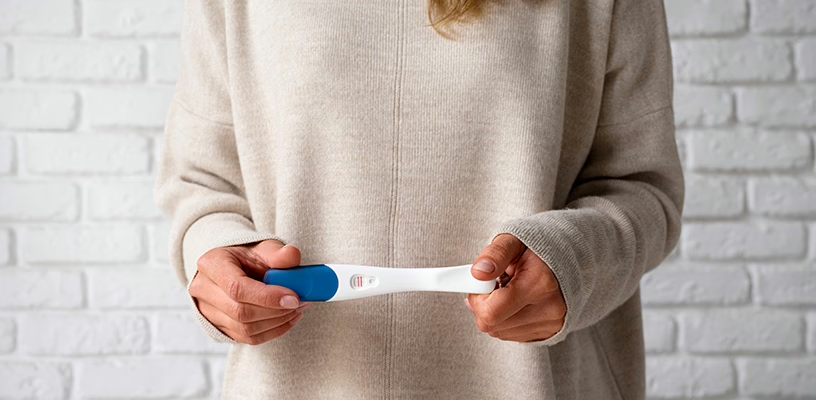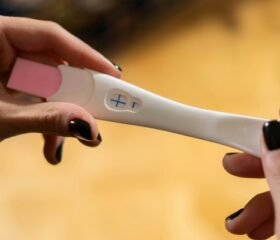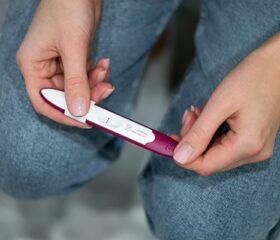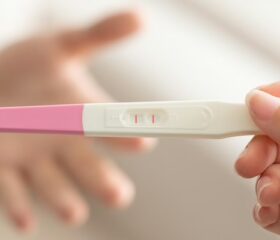False Positive on a Pregnancy Test: Causes, Accuracy, and Next Steps
Seeing a plus sign or two lines on a pregnancy test can come with a rush of emotions: joy, surprise, and maybe a little anxiety. But what happens when that positive result is wrong?

While home pregnancy tests are generally reliable, false positives can still happen. Finding out that you’re not pregnant after an initial positive result can be devastating and leave you with a lot of questions.
Why does this happen? Keep reading to learn more about false positive pregnancy tests, their causes, how often they happen, and what steps to take if you receive a result that turns out to not be accurate.
What is a false positive on a pregnancy test?
Getting a false positive on a pregnancy test means that the test indicated you’re pregnant, but you’re not.
Often, you’ll know you got one if a test came back positive, but then you got your period shortly after. Another possible scenario is if you take multiple tests and only one is positive.
How common are false positives?
The good news is that at-home pregnancy tests are generally quite accurate (at least when used correctly). False positives are uncommon, occurring in less than 1% of tests.
Incidentally, the chances of a false positive are lower than a false negative (when a test that says you aren’t pregnant when you are). Those are also rare, but less so, occurring in approximately 5% of tests. 1
What can cause a false positive on a pregnancy test?
At-home pregnancy test strips and digital tests look for the presence of human chorionic gonadotropin (hCG) in your system. This is a hormone produced during pregnancy. If you get a false positive, the test detected hCG, but not because you’re pregnant at the moment.
Several factors can cause you to have elevated hCG levels despite not being pregnant:
- Recent or nonviable pregnancy: It’s possible the test wasn’t actually wrong and that you recently were pregnant, but had a very early type of miscarriage.
- User error: When pregnancy tests malfunction, this is another likely culprit. It’s possible you didn’t read the test correctly or used an expired test.
- Medical issues: Certain medications and medical conditions can raise your hCG levels beyond the normal range.
Lastly, it’s also possible the test itself was simply defective, but as mentioned, this is quite rare.
Here’s a more detailed breakdown of all of those possibilities:
1. Recent pregnancy and pregnancy loss
You may see a positive test if you had a chemical pregnancy, which is an early miscarriage that usually occurs around the fifth week of pregnancy. This means that the embryo stopped developing (your pregnancy wasn’t viable), but it may have released enough hCG to be detected on a pregnancy test—even if you didn’t experience any pregnancy symptoms. 2
Technically, this isn’t a “false positive” (you were, in fact, briefly pregnant). However, it can definitely feel like one, especially if you didn’t experience any other signs of a miscarriage, like cramping and vaginal bleeding.
The good news is that having a chemical pregnancy doesn’t affect your ability to conceive again in the future.
Other than an early miscarriage, your hCG levels may remain elevated for several weeks after an abortion. It can take up to 4–6 weeks for your hCG levels to return to your pre-pregnancy levels. 3
The larger takeaway is that testing too soon after a recent pregnancy loss won’t give your body enough time to flush the hCG out of your system, which can lead to a false positive result.
2. User error
At-home pregnancy tests are usually 97–99% accurate, depending on how well you follow their instructions. 4 However, mistakes happen.
There are several things you should double-check when using these tests: 5
- Expiration date: Look over the dates on the packaging to make sure you’re not using an expired test, which can cause both false positives and false negatives.
- Collection cup: If you’re using a dip stick test, ensure that the cup or container you use to collect your pee is clean. Watch out for leftover detergent, which is a known cause of false positives.
- Damaged kits: A test can also yield inaccurate results if it’s damaged or exposed to excess heat and moisture.
- Evaporation line: You may see a faint line on your pregnancy test if you take the test and leave it sitting for too long. This is called an evaporation line and it may appear as your urine dries. It can look a lot like a positive result, although it may be blurry, faint, or colorless (grayish). 6 Always read the test instructions beforehand to know how long you should wait to check the results, and set an alarm if you need to.
On a related note, some people worry that they’ll cause a false positive by drinking too much water before taking the test. It’s true that this can lead to inaccurate results, but you’re more likely to get a false negative by doing this rather than a false positive. That’s because too much water can dilute the hCG hormones in your system (if there are any) and make it harder for the test to pick them up in your urine.
3. Conditions and medications affecting your hCG levels
Your body undergoes hormonal changes as you age. For instance, if you’re approaching menopause (i.e., you’re experiencing perimenopause), you may have elevated hCG levels that are detectable by a pregnancy test, even when you’re not pregnant.
The same goes for experiencing certain health complications and taking certain medications, both of which can affect the accuracy of at-home pregnancy tests.
Health conditions
The medical conditions that can raise your hCG levels and result in a false positive include:
- Ovarian cysts or cancer
- Cancer, especially of the lung, colon, breast, liver, or stomach
- Pituitary gland disorders or tumors
- Gestational trophoblastic disease
In some (rare) instances, having blood or protein in your urine can also throw off the accuracy of these tests. 5
Medications
While it’s uncommon, some medications can affect your hCG levels and trigger false positives. In particular, fertility drugs containing extra hCG cause this issue. 7 If you’re undergoing fertility treatments, follow your doctor’s instructions regarding pregnancy testing.
Note that alcohol, recreational (illegal) drugs, and medications like birth control and antibiotics do not affect the results of pregnancy tests. 7
What should you do if you get a positive result?
If you get a positive pregnancy test, schedule an appointment with your doctor, whether or not you think the result is correct. They can accurately confirm or rule out pregnancy with a blood test, investigate the underlying causes of a false positive, and provide appropriate guidance going forward.
If you think your positive result may be false, consider retesting in a few days, carefully following the instructions.
In the meantime, it’s best to assume that you’re pregnant until your doctor proves otherwise. Follow a healthy pregnancy diet and avoid risky behaviors like smoking and drinking.
Can blood tests give false positives?
Blood tests are the gold standard, with a 99% accuracy rate. 5 They’re generally more sensitive to hCG than urine tests, so much so that they can tell you when you’re pregnant before you miss your period. 4
Still, they can also produce false positives in rare cases, though that’s usually due to a mistake during lab testing. 5
Be sure to inform your doctor of any medications you’re taking and any relevant medical history, since, as mentioned, these can affect your hCG levels.
How can you cope with getting a false positive result?
Experiencing a false positive pregnancy test can cause all sorts of complicated emotions. Allow yourself to feel them without judging yourself for your reaction.
Talk to loved ones, practice self-care, and seek professional support from a therapist if you need it. It’s important to process your feelings and focus on the future.
Final thoughts
While it’s rare, the possibility of getting a false positive pregnancy test can be unsettling. Again, follow up any positive test with your doctor, even if you suspect the test is wrong. Seeking professional advice will ensure you receive the best possible care going forward.
Article Sources
- WashU Medicine. "Flaw in many home pregnancy tests can return false negative results" Retrieved June 16, 2025.
- Tommy’s. "Chemical pregnancy" Retrieved June 16, 2025.
- American Pregnancy Association. "What are HCG Levels?" Retrieved June 16, 2025.
- MedlinePlus. "Pregnancy Test" Retrieved June 16, 2025.
- Better Health Channel. "Pregnancy testing" Retrieved June 16, 2025.
- Verywell Health. "What Does a Faint Line on a Pregnancy Test Mean?" Retrieved June 16, 2025.
- Office on Women's Health. "Pregnancy tests" Retrieved June 16, 2025.







